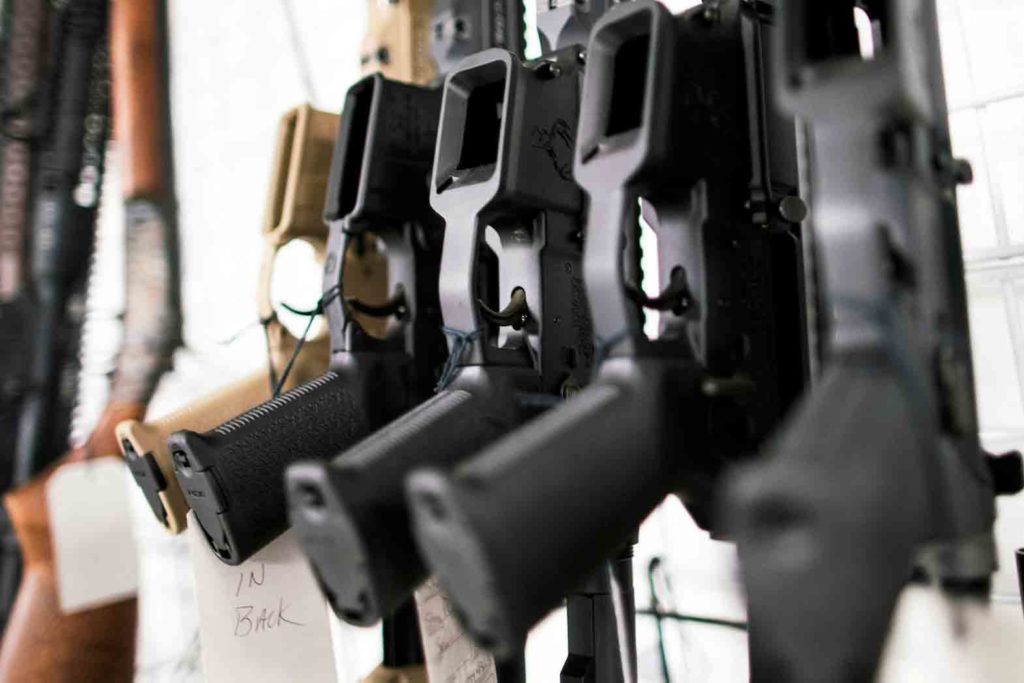Analysis: Republicans aim to stymie gun sale codes at state level

Guns are displayed at Shore Shot Pistol Range gun shop in Lakewood Township, New Jersey, U.S. March 19, 2020. REUTERS/Eduardo Munoz
Legislation being pursued by Republicans in several U.S. states aims to limit use of a planned merchant code for credit card transactions at gun retailers meant to detect suspicious firearms and ammunition sales, undermining a tool welcomed by gun control advocates.
The bills were introduced in states including Texas, Florida, Mississippi, Oklahoma, West Virginia and Wyoming.
They would prohibit or limit banks or payment processors from using the “merchant category code,” or MCC, approved for gun sellers in September by the Geneva-based non-governmental International Organization for Standardization (ISO), which develops standards on various aspects of technology and manufacturing.
The major credit and debit card companies have committed to using the code. Discover Financial Services has said it will introduce it in April and that it is following other companies in doing so. Discover is the first company to publicly state a timetable.
The code was requested from the ISO by Amalgamated Bank of New York, which calls itself a socially responsible lender and investor.
The state proposals mark the latest flashpoint for U.S. Republicans in their attack on the growing corporate consideration of environmental, social and governance (ESG) factors – what some conservatives deride as “woke capitalism.”
The Republican state lawmakers sponsoring the bills have said they want to prevent the code from being used to infringe upon gun rights enshrined in the U.S. Constitution’s Second Amendment.
Jansen Owen, a state representative who is the author of legislation in Mississippi, said that as a conservative he worries that the code among other things could be used to track lawful ammunition purchases.
“I don’t want card companies to raise interest rates or fees on merchants as a way to dissuade them” from selling guns and ammunition, Owen told Reuters.
“This MCC would lead to the creation of a backdoor registry” of gun purchases in violation of state law in Florida, state Senator Danny Burgess told a February hearing on legislation he has authored.
‘UNINTENDED CONSEQUENCES’
Some trade groups representing banks have expressed concern that the state measures could create problems such as exposing only certain financial companies to enforcement or making it harder for consumers to use credit cards across state lines. Some said they do not oppose the bills but worry about possible repercussions.
“We’re working toward a solution that gets what the sponsors want to do and makes sure there’s no unintended consequences,” said Anthony DiMarco, head of government affairs for the Florida Bankers Association, whose members include top Wall Street lenders such as JPMorgan Chase & Co and Wells Fargo & Co.
Wyoming’s proposed “Second Amendment financial privacy” bill stalled last month. Scott Meier, president of the Wyoming Bankers Association, said there was concern among legislators about whether the proposal could expose local banks to penalties even though they had little say on how payment networks and processors adopt the code.
“Banks don’t set these codes,” Meier said.
Some Democrats and gun-control advocates have voiced concern that the bills could reduce the effectiveness of the code for spotting worrisome purchases. They have cited instances in which people who carried out mass shootings bought weapons on credit.
Proponents of the code have said it will enable financial institutions to better assist law enforcement authorities in investigating crimes involving gun violence.
Adam Skaggs, chief counsel for the gun safety group Giffords Law Center to Prevent Gun Violence, expressed opposition to the Republican proposals.
“The only thing they’re protecting is the rights of criminal gun purchasers,” Skaggs said of the legislation.
Skaggs also said the legislation could lead to unpredictable consequences like driving gun retailers to become cash-only businesses.
“We’re wading into uncharted waters here,” Skaggs said.
The new code will not show specific items purchased but will identify where a person shopped by adding gun stores to a list of hundreds of existing retail categories including snowmobile dealers and wig shops.
Peter Pope, a special counsel to Manhattan District Attorney Alvin Bragg, said the codes would allow banks to flag suspicious purchases, for example when people buy a single gun from multiple stores in order to avoid required forms for multiple purchases – just as banks already flag other transactions.
“If the banks could raise their hand when they see indicators of moving money around for narcotics, then they could raise their hand for gun trafficking,” Pope said.
Visa Inc declined to comment on the state bills. Other payment card companies Discover, Mastercard Inc and American Express Co did not respond to requests for comment. A JPMorgan representative declined to comment. Wells Fargo did not immediately provide comment.
Owen, the Mississippi state legislator, said he expects that payment companies could address any technical issues the bills could create.
“I think the credit card companies are going to have to adapt on a state-by-state basis,” Owen said.

